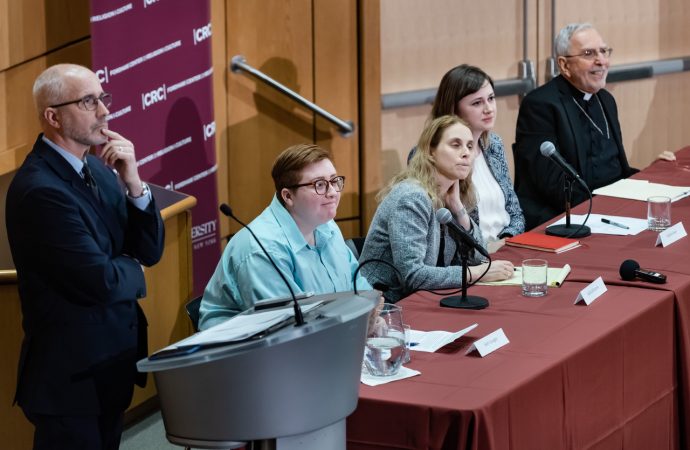In his efforts to weave together a “seamless garment” - linking together common concern for issues of abortion, euthanasia, war, and other threats to human life - the late Cardinal Joseph Bernardin was an underappreciated visionary leader, not unlike Pope Francis today, according to Bishop Gerald Kicanas.
In a lecture at Fordham University, where 35 years ago, Bernardin delivered a landmark address that would radically shape and divide the Catholic Church’s engagement on the defense of human life, one of his protégés, Kicanas, returned on Tuesday evening to defend and promote anew what Bernardin termed a “consistent ethic of life.”
Kicanas - who served as a priest and then auxiliary bishop under Bernardin in Chicago, and later as bishop of Tucson, Arizona until his retirement in 2017 - extolled Bernardin’s 1983 lecture as “out of the box thinking” that was meant to help move thinking beyond the impasse of so-called social justice Catholics versus pro-life Catholics.
“The presentation ushered in a new way of viewing moral living which emphasized the protection of the unborn, care of the poor, the elderly and the environment as interrelated and intertwined,” he recalled.
“Bernardin asked himself an important question, how can we bring warring factions within the Church who feel passionately about one or another life issue to come together in support and defense of everything that upholds life and its God-given dignity?” he continued. “His answer was the ‘consistent ethic at every stage and in every circumstance.’”
For Kicanas, Bernardin’s legacy is “a profile in courage” - seeking to bring harmony to a church and a world in discord - through humble innovation and vision.
While his critics, he noted, said Bernardin was downplaying the rights of the unborn and giving all moral issues equivalent value, Kicanas countered that Bernardin believed they were the ones watering down Church teaching by failing to link life issues to social issues in a consistent ethic.
Such a divide continues to plague current partisan political engagement, Kicanas observed, by a “cherry-picking approach” to the issues of human life.
“The separation of the broad range of life issues has resulted in a red/blue world where affiliation with one’s political party trumps one’s faith. The camps have been formed and allegiance to one camp in opposition to the other is expected, even required,” he said.
“Party allegiance becomes the frame by which truth is determined. We see that in the media that presents truth from the perspective of the party with which one is aligned. We saw this on display most vividly in the contentious hearings and divided confirmation of the latest Supreme Court nominee. Roe vs. Wade became the lightning rod for whether one was for or against the nominee and how one evaluated the charge of sexual misconduct brought against him,” he added.
While Kicanas stressed that there has been an “interrelatedness of the life issues,” from Popes John Paul II and Benedict XVI, Bernardin’s consistent ethic of life approach has received particular elevation in the era of Francis in his writings and especially in his actions.
“Francis is master of the symbolic, showing without words his compassion and care for those on the margins, for those whose lives seem not to matter,” he posited, adding that while Francis has spoken out against abortion in strong terms, like Bernardin, he’s regularly connected it to other issues, such as capital punishment or the environment.
He continued: “Francis challenges a throw-away culture that places priority on my needs, my interests at the expense of our environment and other human beings.”
Both the pontiff and Bernardin, Kicanas argued, see dialogue and building common ground with those who disagree with certain areas of Church teaching as the preferred means of cultural engagement, rather than warring against it.
Following Kicanas’s remarks, David Gibson of Fordham’s Center on Religion and Culture which hosted the lecture, moderated a panel of respondents featuring evangelical author Katelyn Beaty, Rabbi Jill Jacobs, and pro-life activist Herb Geraghty of Rehumanize International.
Beaty said she believed the “consistent ethic of life” could be a means for evangelicals to recover its “arguably compromised witness in the public square,” - a nod to the strong show of evangelical support for President Donald Trump in the 2016 election.
While she said she was sympathetic for the need to have concentrated efforts that focused on the issue of abortion, she said the “beauty of Bernardin’s vision” is that “each person’s flourishing is connected with every person’s flourishing.”
Jacobs recalled the Jewish tradition’s belief that “every injury to a human being is an injury to God,” noting that the shared understanding of humans being created in the image of God is common ground for Christians and Jews, despite theological differences on abortion.
Geraghty, who is an atheist, rejected the idea that one has to be a person of faith to be pro-life, insisting that Bernardin’s “consistent ethic” is “incredibly baseline,” focusing on not killing other individuals.
“I don’t think you need a higher power to tell you that,” she added.
Bernardin’s vision, she continued, “challenges everyone, but it does so in a way that calls people in rather than out.”
Concluding his remarks, Kicanas heralded the Bernardin legacy as a way forward for a divided church and country.
Citing philosopher Rodrigo Guerra Lopez, he challenged that “the present day magisterium must be interpreted in the light of the preceding magisterium. However, the preceding magisterium can also receive light from the present one.”
“We have yet to grasp the notion of the consistent ethic at every stage and in every circumstance which draws us to see a moral dimension to all issues that jeopardize human life,” he lamented.
“As we celebrate this anniversary of Bernardin’s lecture at Fordham, we can be confidant his words were not spoken in vain,” he said. “They continue to impact the Church.”

